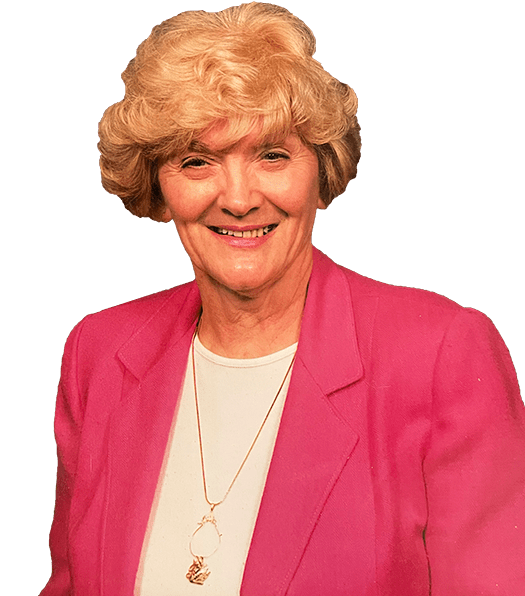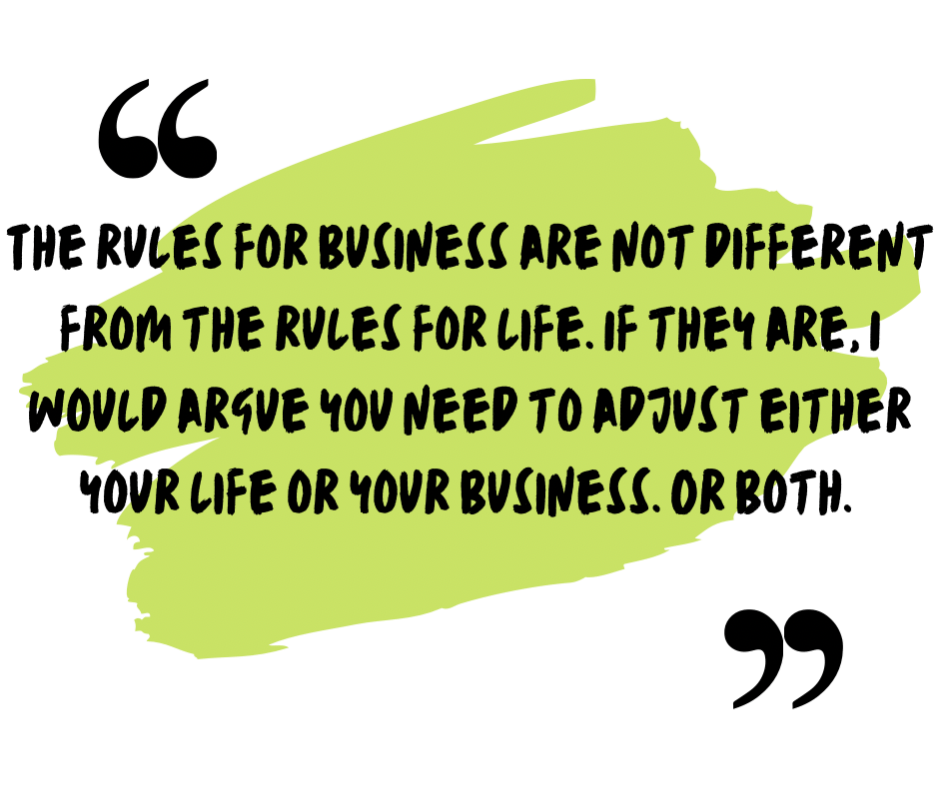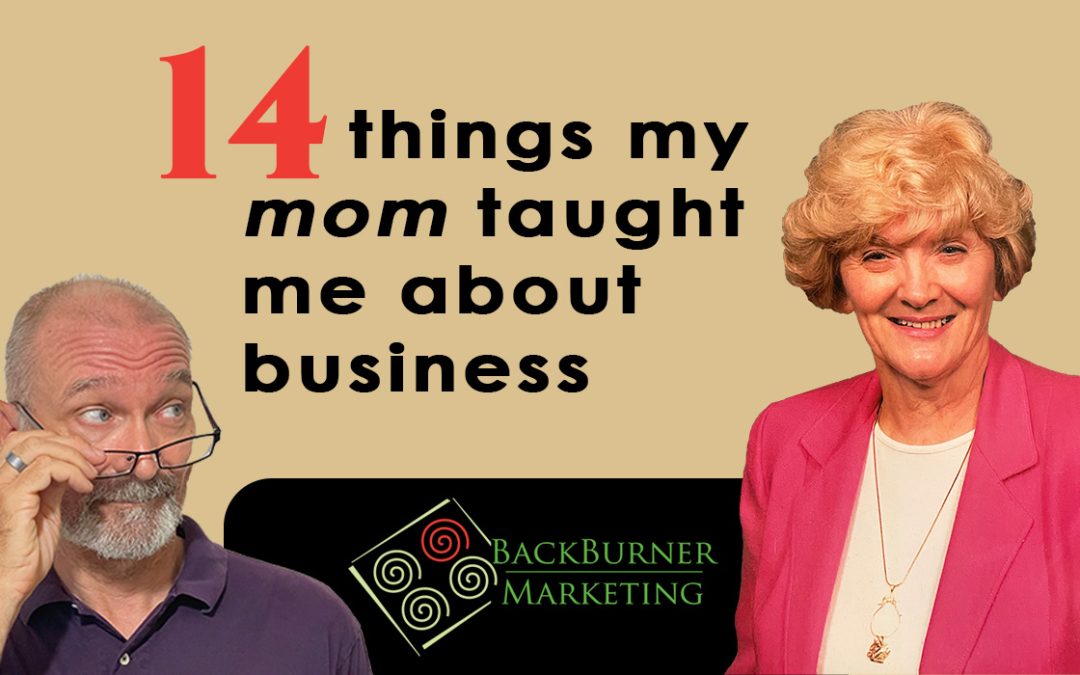14 things my mom taught me about business
After three decades in marketing, it’s time I fessed up that everything I know about business I learned from my mom.
A wise mentor in person is worth a million hardback gurus.
Is it business blasphemy to admit that I do not derive much inspiration from business books? I’ve always found them to be dry, self-indigent, and, while buzz-worthy, they are often not biz-worthy.
In reality, the vast majority of the American business ecosystem is like a different world compared to that of the famous gurus. It is a far bigger pond, with much smaller fish that move in smaller schools. What worked at Apple or Sony might not scale down to the average SMB. I’d rather learn first-hand how-tos and problem-solving tips from someone who’s been in the trenches in a business like my typical clients—like the one my father, and then mother, ran when I was young. In the real world of family, small, and startup business, fame is irrelevant. Functional leadership is everything.
Most “business gurus” operate in a different world from mine. I work with small-to-medium companies, often startups or early stage enterprises. What worked at a vast, multinational conglomerate may, if distilled down to its syrupy essence, be applicable to my clients but most of the time they just need systems and solutions that work solidly and without fail.

The king is dead – will the kingdom survive?
My mother, Thelma “Mickey” McMaster Williamson, was an under-educated, supremely confident, incredibly wise, and straight-up ballsy woman who was virtuoso enough to be able to play life by ear.
After my father passed away, Mickey took over his large, successful business in Buffalo, New York (required verbiage: “Go Bills!”). With just a high school education and one semester of secretarial school, my mom grabbed the company bull by the horns and became a business leader. Because she had to…and because she was inherently sharp and rough enough to do it.
It is a trial by fire that is unique to the world of small-to-medium sized businesses, whether they are family-owned or an entrepreneurial startup. If a founder/owner dies or otherwise vanishes from the scene, the resulting leadership vacuum can cause the business to implode.
Mickey kept it together. She successfully led the business for a number of years before guiding it to a merger with a large corporation. She then managed a large high-end department store and helped me launch my second business venture.
How my mom became my go-to biz guru.
She may have worked for me, but I learned from her. Most broadly, I learned that while we have expectations in life, life has expectations of us. You do your part. No questions. Don’t feel like it? Too bad.

14 things I learned about business from my mom.
Lesson 1: If you have expectations in life understand that life has expectations of you
When my father died at the age of 60, I understood that nothing in life is permanent or guaranteed, so if I wanted something out of life I would have to make it happen.
Mickey had clear expectations about my role in the household. I would do my chores. I would study. I would get As in school. Her expectations were the roadmap for my behavior, and taught me discipline and responsibility. Hard work is rewarded (see lesson 9 below).
Lesson 2: Owning your own company is a difficult, frustrating, terrifying, and satisfying experience. Expect all those emotions.
There is nothing more satisfying than running your own business. You call the shots and, while you pay the price for mistakes, the freedom of working without a net is liberating. The only place to pass the buck is to yourself. Lessons learned from watching Mickey at work, I started my first company at age 20. It’s been a rewarding emotional rollercoaster ever since!
Lesson 3: If you want to be your own boss expect to be your own labor, too.
The thing about running your own show is that, no matter how many employees you might have or how long you’ve been in business, you will still have to put in the long hours. If someone calls in sick and no one can fill, guess who does…you! You are also the one who cleans up messes of all kinds, from physical to financial.
Lead from the front or do not lead at all.
My mom would be the last person to leave the office, the first person in, and the one who did the crappy side jobs no one else was really unqualified enough to do!
Lesson 4: Be reliable. Don’t say you will do it if you genuinely cannot.
Put another way, don’t overpromise and under-deliver. “The worst thing is a liar,” Mickey always said. (She pronounced it “lyre,” like her Canadian-Irish father.) She had no patience for repairmen or companies—or even her own kids—who say they were going to do something if they even suspect it was not going to happen. Don’t say “Yes” if “No” is all you can produce. “No” isn’t a failure, it is a parameter.
Lesson 5: Be on time. Too early throws people off; too late turns them off.
My mom’s take on appointments was both practical and insightful. “Be on time. Too early throws people off; too late turns them off.”
Popular opinion that says being early for a business function makes you seem polite and prepared. Mickey thought that showing up too early–say, more than ten or fifteen minutes–for a business function makes you appear, at best, too eager. At worst, you risk looking like you have so little going on in your business world that you can take extra time out to sit idly in a waiting room.

Lesson 6: Dress nicely wherever you go. You never know when you will run into someone important.
To Mickey, bumping into someone outside your home when you are dressed like you were still in your home was a two-fold mistake. First, packaging is important: “You can’t judge a book by its cover, but you probably won’t read it if it looks unappealing.”
Second, it may not matter to you that you are wearing a stained T-shirt and torn shorts, but it might to the potential business contact, teacher, nice young lady (that was directed to me), or neighbor. “Do you want them to think you are a slob and have nothing nice to wear?”
I used to kid my mom that she would get dressed up to go to the convenience store. “Of course,” she would say. “What if I run into someone important?”
Lesson 7: Everybody is important.
Mom felt everyone was important. A poor kid in a blue-collar city grows up with an appreciation of people more than of position. It did not matter what you did for a living, where you lived, or how much money you had, Mickey treated all with the same respect and equality.
This is practical as well as personal. Everyone has feelings, hopes, dreams. People you are nice to will be, ideally, nice back. And, as mom said, you catch more flies with sugar than with vinegar, so you may as well be sweet all the time. It can’t hurt. One of those people you are nice to might just wind up being a customer because of it.
Lesson 8: Plan ahead. Plan well. Plan for Plan B. And Plan C. Plan to use all your plans.
“The secret to thinking on your feet is not having to.” Mickey was a thinker and a planner. Her modus operandi was to examine a problem from all angles and make a solid plan of attack. Then she’d examine her plan, find its weaknesses and make a plan for each. And she’d do the same for those plans. If one failed, the next was ready to go. It looked like she was thinking on her feet but really she was seamlessly moving through her list of solutions. Don’t improvise if you don’t have to!
Only an idiot goes into a situation without a plan. Only a fool makes only one plan. Momma didn’t raise no fool, so I generally have a bunch of fallback plans.

Lesson 9: If you work hard, you will eventually succeed.
My father’s business started from nothing. He invented all the mechanical and electrical systems that were the core of the operation. The company did well, mainly because he worked a lot—a LOT—and his efforts were rewarded with financial success. After he passed, my mom made no bones about the fact that we owed our pleasant living conditions to my dad’s (and her) daily grind. (Note, this isn’t a treatise on work-life balance or quality family time.) I saw the opposite in friends and even some family members who were expert at doing not a lot of anything…and they had not a lot of anything to show for it.
Lesson 10: Success might not look like what you expected.
Funny thing about success is that it does not always shape up the way you expect—and your expectations can change over time. My mother was raised with the idea that marrying a good-looking man and having a clutch of kids was successful. Then she became a successful business owner, then manager of a ritzy department store. She loved her final tiny brick home far more than the large one I grew up in. Different flavors of success came at different times.
Lesson 11: If something goes wrong, don’t make excuses. Look for the reasons why and learn from them.
One thing my mom could not abide was an excuse. An excuse is more palatable than the reason, which we so often do not want to admit to others–or ourselves.
Find the reason things went south and address it. Learn from it. Go on.
Lesson 12: Don’t do the same wrong things again. If you do, don’t be surprised that it didn’t work. Again. Mom and Einstein…same page.
Einstein reportedly said that, “Insanity is doing the same thing over and over and expecting different results.” My mom said something similar: “If it didn’t work the first three times why would you be dumb enough to think it would work now?” I suspect he was more bemused when he said his quote—and less angry—than my mom.
Lesson 13: Pick the right name. It makes a difference.
This from a woman named Thelma who went by Mickey. People who grow up with names they hate know the real transformative power of picking a better one. The right name is powerful. Thelma would have dressed in beige and worn sensible shoes. Thelma became Mickey, and she was a Mickey—feisty, fun, funny.
Businesses and products benefit from the right name. There is a whole consulting industry based on making up names for products. I think they make most of their money on pharmaceuticals.
Lesson 14: Rely on yourself but have faith. In yourself, in God, in the universe.
My mom was devoutly religious and drew her strength from her belief in God. No matter how bad things got, she knew she had God in her corner. At the same time, she routinely said, “The Lord helps those who help themselves.” Whatever you believe in, believe in it with all your might, and be sure to have the utmost faith in your own abilities, ideas, and vision.
Listen to my mom.
The rules for business are not different from the rules for life. If they are, I would argue you need to adjust either your life or your business. Or both.
In my everyday life, as well as in my role as a marketing consultant, I apply my mom’s rules to great effect. They are basic guides but they seem to be just as applicable today as when I was a latchkey kid plodding home through snow to an empty house.
Try them. I think you will find them useful.

About the author
Richard Williamson has enjoyed a three decade career in marketing, advertising, and public relations. Formally trained in graphic design and copywriting, he is a partner here at BackBurner Marketing and founder and lead designer of the Logo Design Group. Find out more about him here or at www.RichardWroteThis.com.
Richard is available for brand and marketing consulting, business coaching, and as a fractional Chief Marketing Officer.



